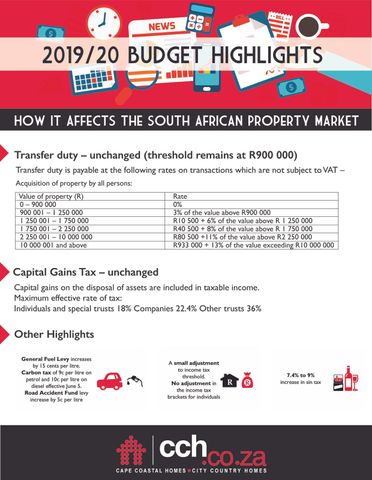News Flash: SA Budget Highlights 2019/2020
- Recent increases: Personal income tax rates, increases in the VAT rate as well as increases in dividends tax, capital gains tax (CGT), donations tax and estate duty (over certain limits). Despite these measures raising an additional R 99 billion in collective revenue over the last four years, tax revenue as a proportion of GDP has continued to decline. Consolidated budget deficit slips to 4.2% of GDP for 2018/2019 and the debt to GDP levels will breach 60% level in 2023/24 - very bad!
Budget 2019 - What You Need To Know
The following stand out for the property market:
- No increase the inclusion rate of capital gains tax.
- No adjustment in transfer duty or the threshold of R900,000.
Funding for the upgrading of informal settlements and the Our Help to Buy subsidy, a pilot project with R950 million over three years to help first-time home buyers acquire a home, is good news for the property market.
Also noteworthy is the support for private sector investment in agriculture via support for emerging farmers.
The need to respond to rapid urbanisation by shifting from 'horizontal' development to vertical or 'going up', as part of an integrated development plan. This would suggest that government incentives may reinforce the shift towards the construction of more sectional title homes - a trend already evident in many of the country's major metro housing markets.
The good news about the Budget of 2019 is that we've had so much bad news in the recent past, it only left room for solutions to our economic challenges.
- Priorities for Budget 2019:
- - Narrow the budget deficit and stabilise the national debt-to-GDP ratio
- - Restructure the electricity sector and reduce the immediate risks Eskom poses to the economy and public finances
- - Renew economic growth by strengthening private-sector investment, improving the planning and implementation of infrastructure projects, and rebuilding state institutions
- To limit the negative impact on economic growth, a decision was taken not to increase tax rates in any category this year. Instead, collections will be increased by not adjusting for inflation - the first time since the early 1990's. It is felt that improved efficiency of tax administration will go a long way to improving collections overall.
- Revenue shortfall collection for 2018/2019:
- Initially estimated at R 27.4 billion at Medium Term Budget Policy Statement (MTBPS)
- Now increased to R 42.8 billion- which represents an increase in the expected shortfall between October and now, by R 15.4 billion.
- National Treasury has attributed the shortfall to the following factors:
- Economic weakness thereby resulting in lower than estimated corporate and personal income tax collections; and
- Poor tax administration that has been in the spotlight of late.
- Interesting to note is that approximately half of the additional R15.4 billion shortfall has been attributed to the higher than expected VAT refunds, a symptom of the poor tax administration!
- Budget aim - to raise the additional R 15 billion, as follows:
- R 12.8 billion from not increasing the personal income tax rates, as a result of inflation. In previous years only adjusted lower income bands; this year no adjustment at all!
- R 1 billion from not increasing the medical tax credits
- R 1.3 billion from an overall 29c/litre increase in fuel levies (petrol and 30c for diesel), including a "carbon tax"
- R 1 billion for sin taxes
- Total tax collections is estimated at around R1.3 trillion for the year however, government will still have to borrow R 243 billion in the next year just to fund its expenses
- Where does government get the money from?
- Personal Income Tax R 552.9 billion - 43% of total tax revenue
- Corporate income tax R 229.6 billion - 18% of total tax revenue
- VAT R 360.5 billion - 28% of total tax revenue
- Customs and excise R 106.8 billion - 8% of total tax revenue
- Sin taxes:
- Cigars - R 7.80
- Cigarettes - R 16.66
- Can of beer - R 1.74
- Sparkling wine - R 10.16
- Wine - R 3.15
- Sorghum beer - no change
- Whisky - R 65.84
- Where will the money go to?
- R 30 billion for new schools
- R 111.2 billion on tertiary qualifications
- R 567 billion towards social grants
- R 481.6 million to SEDA/small business
- R 3.7 billion to emerging farmers
- R 69 billion to Eskom over 3 years
- R 10 billion to land reform
- R 4 billion to SAA
- 34.4c out of every rand of government expenditure goes to salaries - R600 billion pa, a saving of R 50.3 billion as a result of natural attrition and early retirement
- R 200 billion pa to service national debt - R 1 billion every working day! This is set to increase by 21% over 3 years to R 247.4 billion by 2022

